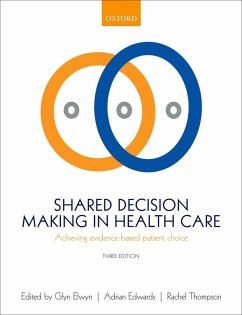
The Ethics of Shared Decision Making (eBook, ePUB)
Versandkostenfrei!
Sofort per Download lieferbar
33,95 €
inkl. MwSt.
Weitere Ausgaben:

PAYBACK Punkte
17 °P sammeln!
Patients today are more empowered and knowledgeable than they have ever been. By law, they must be told about the risks and benefits of proposed treatments and give informed consent before treatment is initiated. Through the democratization of medical information, they have access to peer-reviewed medical journals. Social media allows patients to share stories with others and to learn about other people's experiences with various treatments. There are websites written by experts at leading medical schools to help patients understand diseases and treatments. They have the right to see their med...
Patients today are more empowered and knowledgeable than they have ever been. By law, they must be told about the risks and benefits of proposed treatments and give informed consent before treatment is initiated. Through the democratization of medical information, they have access to peer-reviewed medical journals. Social media allows patients to share stories with others and to learn about other people's experiences with various treatments. There are websites written by experts at leading medical schools to help patients understand diseases and treatments. They have the right to see their medical records. The net result of all changes is a shift in the power balance between doctors and patients. Ideally, as a result of these shifts, the patients' values and preferences should guide treatment decisions. However, this proliferation of information often leads to confusion rather than clarity. Publicly available information often includes seemingly contradictory conclusions and recommendations. Patients don't know which opinions to trust. So, although patients have more information than ever, and many want to make decisions for themselves, they need more guidance than ever to help them process an avalanche of information. This volume aims to help both medical professionals and their patients navigate the evolving healthcare landscape by analyzing the process of shared decision-making (SDM) in clinical medicine. The concept of SDM has emerged in the last two decades as a middle ground between, on the one hand, old-fashinioned physician paternalism of the "doctor-knows-best" variety and, on the other hand, unfettered patient autonomy by which patients are thought capable of individually and independently choosing their own medical interventions. Advocates of SDM imagine that decisions will be made best if they follow a complex discussion and negotiation between doctor and patient; such discussions should incorporate the doctor's medical and technical expertise as well as the patient's goals, values, and preferences. SDM takes different forms for different patients in different clinical circumstances. This volume gathers experts in SDM to share their insights about how it ought to be done. The authors include clinicians, social scientist, and philosophers, all of whom have thought about or cared for patients from a variety of backgrounds and in a variety of clinical circumstances. The papers explore the complexity of SDM and offer practical guidance, gained from years of experience, about how to employ SDM as effectively as possible.
Dieser Download kann aus rechtlichen Gründen nur mit Rechnungsadresse in A, B, BG, CY, CZ, D, DK, EW, E, FIN, F, GR, HR, H, IRL, I, LT, L, LR, M, NL, PL, P, R, S, SLO, SK ausgeliefert werden.













